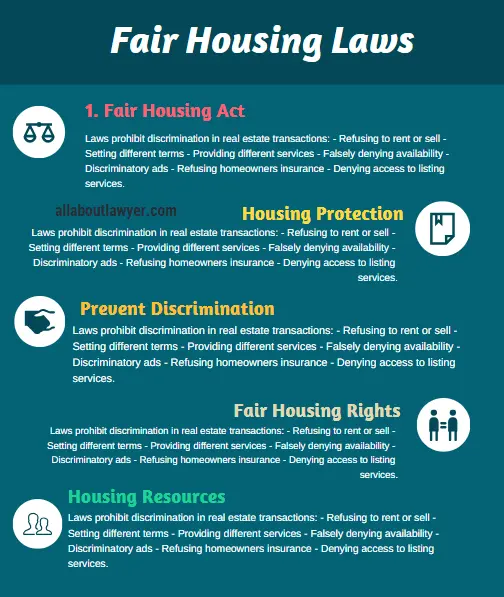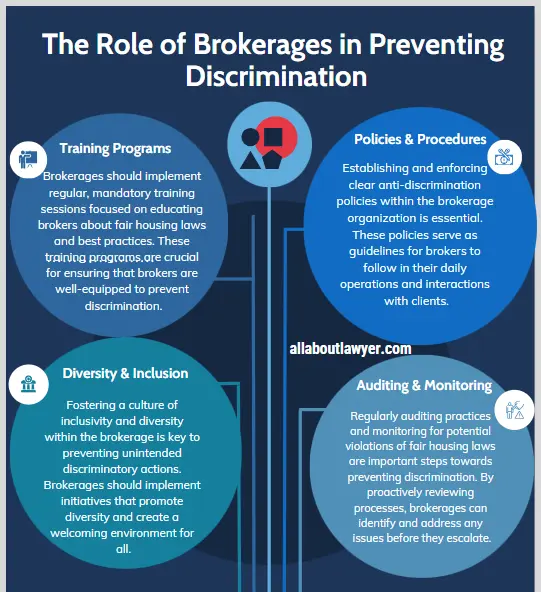A Real Estate Broker Who Accidentally Violates Fair Housing Laws
In the complex world of real estate, the line between ethical practice and unintended discrimination can sometimes blur, leading to situations where even well-intentioned professionals find themselves on the wrong side of fair housing laws. This article delves into the delicate issue of a real estate broker who accidentally violates fair housing laws, property agent’s unintentional discrimination, exploring the causes, consequences, and prevention strategies for such incidents.
Understanding Fair Housing Laws
Before we dive into the specifics of accidental violations, it’s crucial to establish a clear understanding of fair housing laws. These regulations are designed to ensure equal access to housing opportunities for all individuals, regardless of their race, color, national origin, religion, sex, familial status, or disability.
The primary legislation governing fair housing in the United States includes:
1. The Fair Housing Act of 1968
2. The Equal Credit Opportunity Act
3. The Americans with Disabilities Act
These laws prohibit discrimination in various aspects of real estate transactions, including:
– Refusing to rent or sell housing
– Setting different terms, conditions, or privileges for sale or rental
– Providing different housing services or facilities
– Falsely denying that housing is available for inspection, sale, or rental
– Making, printing, or publishing discriminatory advertisements
– Refusing to provide or discriminating in the terms of homeowners insurance
– Denying access to or membership in any multiple listing service or real estate brokers’ organization

How Unintended Bias Occurs
Despite the clear guidelines set forth by fair housing laws, realty experts can sometimes find themselves engaging in unaware prejudice or unconscious housing bias. This can happen in various ways:
1. Use of Discriminatory Language:
A broker might use phrases in listings or conversations that inadvertently exclude certain groups, such as “perfect for young professionals” or “quiet neighborhood,” which could be seen as discriminatory against families or certain age groups.
2. Steering:
A real estate professional might unintentionally guide clients towards or away from certain neighborhoods based on assumptions about their preferences, which can be seen as a form of discrimination.
3. Inconsistent Information Provision:
Accidentally providing different information about available properties to different clients based on protected characteristics.
4. Accessibility Oversights:
Failing to consider or accommodate the needs of clients with disabilities, even if unintentional.
5. Discriminatory Advertising:
Using images or language in marketing materials that favor certain groups over others, even if not deliberately exclusionary.
Read also: What Is The New Real Estate Commission Law In The US?
Case Study: The Unintended Consequences of ‘Helpfulness’
Consider the following scenario: A well-meaning property consultant unintentionally commits a fair housing act violation while trying to be helpful to a client. The broker, aware that a particular neighborhood has a large population of a specific ethnic group, assumes that a client of the same ethnicity would prefer to live there. Without being asked, the broker focuses on showing properties only in that area.
While the broker’s intention was to be helpful, this action constitutes steering and is a clear violation of fair housing laws. The broker has made assumptions based on the client’s ethnicity and limited their housing options accordingly, even if done with good intentions.
Related article: Can I Lose My House Due to an At-Fault Car Accident? Your Complete Protection Guide
The Impact of Unintended Discrimination
The consequences of a realtor’s equality law mistake can be far-reaching, affecting not only the individuals directly involved but also the broader community and the real estate industry as a whole.
1. Legal Consequences:
Even unintentional violations can lead to legal action, resulting in fines, license suspension, or revocation.
2. Damage to Reputation:
A broker’s professional reputation can be severely damaged, even if the discrimination was accidental.
3. Erosion of Trust:
Such incidents can erode trust in the real estate profession, making it harder for all agents to build relationships with clients.
4. Perpetuation of Segregation:
Unintended bias can inadvertently contribute to ongoing patterns of housing segregation.
5. Emotional Impact on Clients:
Clients who experience discrimination, even if unintentional, may suffer emotional distress and loss of housing opportunities.
Prevention Strategies: Avoiding Unintended Discriminatory Practices
To avoid accidental non-compliance with fair housing laws, real estate professionals should implement the following strategies:
1. Continuous Education:
Regularly attend fair housing training sessions to stay updated on current laws and best practices.
2. Self-Awareness:
Develop a heightened awareness of personal biases and work actively to counteract them.
3. Standardized Procedures:
Implement consistent procedures for all clients to ensure equal treatment.
4. Language Audit:
Regularly review all marketing materials, listings, and communications to ensure they are free from potentially discriminatory language.
5. Client-Led Interactions:
Allow clients to lead in expressing their preferences rather than making assumptions.
6. Diversity in Marketing:
Ensure that marketing materials represent diverse populations.
7. Accessibility Considerations:
Proactively consider and accommodate the needs of clients with disabilities.
8. Documentation:
Keep detailed records of all client interactions to demonstrate consistent treatment.
9. Seek Feedback:
Regularly solicit feedback from clients and colleagues to identify potential areas of unconscious bias.
10. Use of Technology:
Utilize technology tools designed to help identify and prevent discriminatory practices.
The Role of Brokerages in Preventing Discrimination
While individual brokers bear significant responsibility in adhering to fair housing laws, brokerages also play a crucial role in preventing unintended discriminatory actions:
1. Comprehensive Training Programs: Implement regular, mandatory training on fair housing laws and best practices.
2. Clear Policies and Procedures: Establish and enforce clear anti-discrimination policies within the organization.
3. Diversity and Inclusion Initiatives: Foster a culture of inclusivity and diversity within the brokerage.
4. Auditing and Monitoring: Regularly audit practices and monitor for potential violations.
5. Support Systems: Provide resources and support for brokers to consult when they’re unsure about potential fair housing issues.
6. Accountability Measures: Implement accountability measures for ensuring compliance with fair housing laws.

Responding to Accidental Violations
If a real estate professional realizes they have committed an unintended fair housing breach, immediate action is crucial:
1. Acknowledge the Mistake: Recognize and acknowledge the error, even if it was unintentional.
2. Seek Legal Counsel: Consult with a legal professional specializing in real estate law for guidance.
3. Rectify the Situation: Take immediate steps to correct the discriminatory action and its effects.
4. Report to Supervisors: If working within a brokerage, report the incident to supervisors or compliance officers.
5. Additional Training: Voluntarily undergo additional fair housing training.
6. Implement New Safeguards: Develop and implement personal strategies to prevent similar incidents in the future.
The Broader Context: Systemic Issues in Real Estate
While addressing individual instances of unintended discrimination is crucial, it’s also important to consider the broader systemic issues within the real estate industry that can contribute to these problems:
1. Historical Patterns: The legacy of historical housing discrimination continues to influence current patterns and practices.
2. Industry Demographics: The lack of diversity within the real estate profession itself can contribute to unconscious biases.
3. Market Pressures: The competitive nature of the real estate market can sometimes lead to cutting corners or making hasty judgments.
4. Technological Challenges: The increasing use of AI and algorithms in real estate can sometimes perpetuate existing biases if not carefully designed and monitored.
Conclusion
The issue of a real estate broker who accidentally violates fair housing laws is a complex and sensitive topic. While the intention may not be to discriminate, the impact of such actions can be significant and far-reaching. By understanding the various ways in which unintended discrimination can occur, implementing robust prevention strategies, and fostering a culture of awareness and inclusivity, the real estate industry can work towards eliminating these incidents and ensuring fair housing for all.
As the real estate landscape continues to evolve, it’s crucial for all professionals in the field to remain vigilant, continuously educate themselves, and actively work towards creating an equitable housing market. By doing so, we not only comply with the letter of the law but also uphold the spirit of fairness and equality that is fundamental to the real estate profession.
Related Articles For You:
When Does the New Real Estate Law Go Into Effect?
What Does the New Real Estate Law Mean?
FAQs
Can a real estate broker be held liable for unintentional discrimination?
Yes, a broker can be held liable for fair housing violations even if they were unintentional. The law focuses on the impact of the action rather than the intent.
What should I do if I realize I’ve accidentally violated fair housing laws?
Immediately acknowledge the mistake, seek legal counsel, take steps to rectify the situation, report to supervisors if applicable, and undergo additional training to prevent future occurrences.
How often should real estate professionals undergo fair housing training?
While requirements vary by state, it’s generally recommended to undergo fair housing training annually, or more frequently if there are significant changes to the laws.
Can using certain words in property listings violate fair housing laws?
Yes, using certain words or phrases that could be seen as exclusionary or preferential towards specific groups can violate fair housing laws. It’s important to use neutral language in all listings and advertisements.
Are there any exceptions to fair housing laws?
While fair housing laws are comprehensive, there are a few narrow exceptions, such as senior housing communities or certain religious organizations. However, these exceptions are very specific and limited, and it’s crucial to consult with a legal professional before assuming any exceptions apply.
For more information you can visit All About Lawyer website.
About the Author

Sarah Klein, JD, is an experienced estate planning attorney who has helped clients with wills, trusts, powers of attorney, and probate matters. At All About Lawyer, she simplifies complex estate laws so families can protect their assets, plan ahead, and avoid legal headaches during life’s most sensitive moments.
Read more about Sarah
